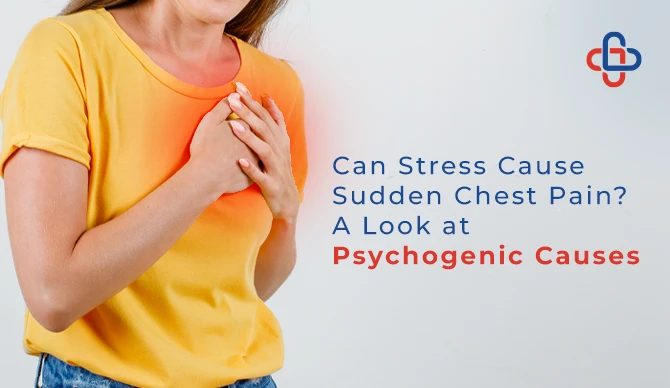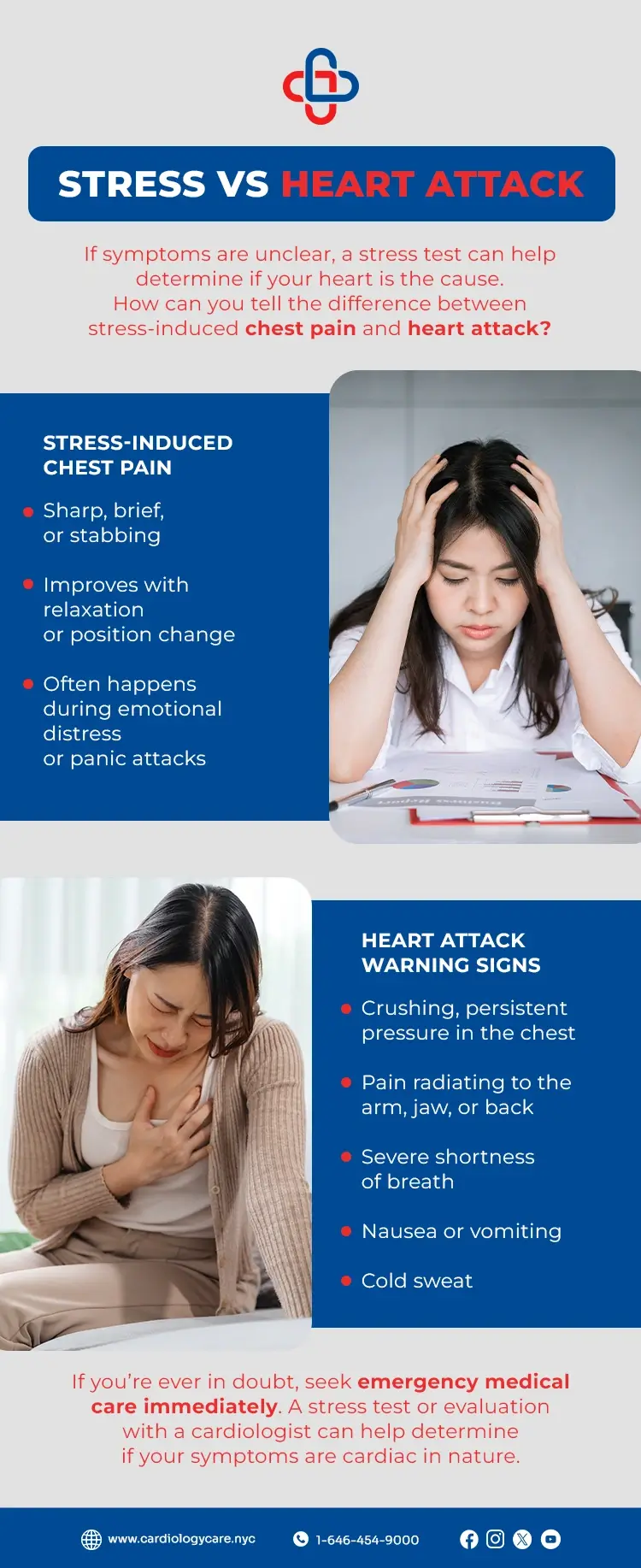Your heart races, your chest feels tight, and you wonder, am I having a heart attack, or is it just stress?
Sudden chest pain can be terrifying. It’s one of the main reasons people rush to the ER and for good reason. But while heart disease is serious and must always be ruled out, stress and anxiety are common (and often overlooked) causes of real, physical chest pain.
Learning to tell the difference between stress-related (psychogenic) chest pain and serious cardiac conditions is critical for your safety and your peace of mind.
Table of contents
Can Stress Really Cause Sudden Chest Pain?
Yes. Stress and anxiety can absolutely trigger sudden chest pain that feels very real.
When you’re under stress, your body’s fight-or-flight response kicks in. Adrenaline surges. Breathing changes. Muscles tighten. This can lead to:
- Chest tightness
- Short, sharp pains
- A feeling of pressure or heaviness
Psychogenic chest pain isn’t imaginary — it’s a real, physical reaction to stress. Can stress cause chest pain? Absolutely. It’s one of the most common non-cardiac causes of sudden chest pain.
What Does Stress-Induced Chest Pain Feel Like?
If you’re experiencing these symptoms, consider our electrocardiogram (ECG) test to check your heart rhythm.
Stress-induced chest pain can vary from person to person, but it often has these features:
- Sharp or stabbing pain vs. dull pressure
- Often fleeting or position-dependent
- Improves with relaxation
Can come with:
- Rapid heartbeat
- Shortness of breath
- Chest tightness
- Sweating
- Dizziness or lightheadedness
People often describe chest pain from stress as a sudden, intense discomfort during periods of high anxiety. It can be alarming but it’s usually not dangerous on its own. Cardiology Care NYC often sees patients with these symptoms and can help evaluate them.
Why Stress Causes Chest Pain?
Worried about the cause? Our heart health screening can help evaluate your overall cardiovascular risk.
How does stress cause chest pain? Here’s what happens in your body:
- Adrenaline surge: Your heart rate and blood pressure rise.
- Hyperventilation: Breathing too quickly can strain chest wall muscles, causing soreness or tightness.
- Muscle tension: Chest and back muscles tighten under stress.
- Cortisol effects: Long-term stress can contribute to inflammation and cardiovascular strain.
These factors explain stress-related chest pain in simpler terms: tension and adrenaline make your chest hurt, even without heart disease. Long term effects of stress on the cardiovascular system include hypertension, increased risk of atherosclerosis, and higher risk of cardiac events.
Stress vs Heart Attack
If symptoms are unclear, a stress test can help determine if your heart is the cause.
How can you tell the difference between stress-induced chest pain and heart attack?
Stress-Induced Chest Pain:
- Sharp, brief, or stabbing
- Improves with relaxation or position change
- Often happens during emotional distress or panic attacks
Heart Attack Warning Signs:
- Crushing, persistent pressure in the chest
- Pain radiating to the arm, jaw, or back
- Severe shortness of breath
- Nausea or vomiting
- Cold sweat
If you’re ever in doubt, seek emergency medical care immediately. A stress test or evaluation with a cardiologist can help determine if your symptoms are cardiac in nature.
Can Stress Cause Other Heart Problems?
While stress-induced chest pain is often benign, chronic stress can have real consequences for heart health:
- Stress-induced heart attack: Rare but real, conditions like Takotsubo cardiomyopathy ( broken heart syndrome ) can mimic heart attacks.
- Hypertension and atherosclerosis: Long-term stress contributes to high blood pressure and arterial plaque.
- Signs stress is affecting your heart: Palpitations, fatigue, high BP, difficulty sleeping.
Can stress cause pericarditis? Not directly, pericarditis is typically caused by infections or inflammation, but stress can exacerbate symptoms or make chest pain feel worse.
Managing Stress to Prevent Chest Pain
If you’re experiencing stress and chest pain regularly, managing stress is essential. Some proven approaches:
- Mindfulness and relaxation techniques: Meditation, yoga, progressive muscle relaxation.
- Controlled breathing exercises: Helps reduce hyperventilation and anxiety.
- Physical activity: Supports cardiovascular health and reduces stress hormones.
- Healthy sleep habits: Restorative sleep lowers stress reactivity.
- Therapy or counseling: For anxiety and panic attacks.
If you’re worried about your heart health, consider talking to a cardiologist about whether a stress test might help rule out underlying disease and give you peace of mind. For personalized evaluation, book a cardiology consultation with our NYC specialists.
Conclusion
Sudden chest pain should never be ignored. Stress is a common cause, but it’s important to tell it apart from serious heart problems. Recognize stress-related pain, manage it, and seek medical help if symptoms are severe. Cardiology Care NYC can help you get clear answers and personalized care.
Frequently Asked Questions
Can diet play a role in reducing stress-related chest pain?
Yes, a balanced diet rich in whole grains, fruits, vegetables, and lean proteins can help regulate stress hormones and support heart health.
Does caffeine make stress-related chest pain worse?
Caffeine can increase heart rate and feelings of jitteriness, potentially making stress-induced symptoms feel more intense.
Is there a link between dehydration and chest pain during stress?
Dehydration can contribute to muscle cramps and tension, which may worsen chest discomfort under stress.
How does age affect stress-related chest pain risk?
While stress can affect any age, older adults should be especially cautious as cardiac risk increases with age.
Can stress management apps help reduce chest pain episodes?
Yes, using mindfulness or relaxation apps can guide breathing and meditation techniques that reduce the frequency of stress-related chest pain.
Source
-
- Good RX – Can Stress Cause Chest Pain
- Pro Trainings – Can Stress Cause Heart Pain? How to Recognize & Manage Symptoms of Stress
- Yale Medicine – Yes, Stress Can Hurt Your Heart: 3 Things to Know
- Health Line – Understanding Anxiety Chest Pain
- Medical News Today – What to know about chest pain and anxiety
Disclaimer
This blog is for informational & educational purposes only and does not intend to substitute any professional medical advice or consultation. For any health-related concerns, please consult with your physician, or call 911.

